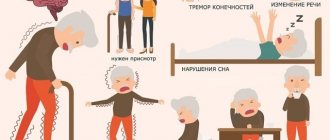The death of a loved one makes you depressed for many reasons, which can affect a person’s emotional state at the same time. That is why it is especially difficult for her to experience. The specific “set” of reasons differs from one person to another. And therefore, depression after the death of a husband, son, mother or other person can be different. As well as ways to get rid of it.
Today we will look at its causes and provide recommendations on how to get out of depression after the death of a son, husband (or other loved one).
Causes of depression
Depression after death is caused by many factors, namely:
- Dependence on the deceased.
- Subjective feeling of destruction of prospects.
- Resentment and guilt.
- Inability to cope with stress.
- A pessimistic view of the world.
- Low volitional potential.
There are, in fact, much more reasons. These are just the most common ones. As a rule, they are closely intertwined with each other, and it is not clear which comes first. Let's look at each of these factors in more detail.
Talking about your pain is the best solution
In this case, no matter how hard it is to do, it is best to talk it out to a loved one. In the family circle, share your pain, cry, shout, share the misfortune with your loved ones. In this way, there is a certain understanding of what is happening, moral cleansing and the release of emotional negativity.
It is important to understand that when a person talks about his pain, it is sure to dull it. Naturally, children never forget their parents, and the memory of them always lives in their hearts and souls. However, it is important to learn to live on, having managed to overcome the loss, so as not to derail your own life.
Dependence on a deceased person
If a person who has lost someone close was dependent on him, then death leads to the question: “How can I continue to live?” The problem here is not only that a loved one has passed away, but also a feeling of inability to adapt to future life. Before you get rid of depression, you first need to understand which of these types of addictions work specifically in your case.
- Material dependence. For example, if depression occurs after the death of the husband, who was the breadwinner of the family. The problem can be solved simply - you need to learn how to make money. Of course, she will not resurrect a dead man, but the emotional burden will be significantly reduced.
- Intellectual addiction. This is when the deceased was a bearer of some knowledge, acted as a teacher, and was in authority with loved ones. And when he dies, a person feels incapable of making decisions. The problem can be solved simply by replenishing intellectual capital. Read books, think, learn to make decisions on your own. It is worth remembering that any crisis situation is associated primarily with opportunities, which can only be taken advantage of through training. The saying “study, study and study again” works at all times, in all centuries.
- Emotional dependence. This is when a person can only receive a feeling of satisfaction with life, happiness, and joy from other people. And when death comes to someone who evoked positive emotions, his dependent relative or friend loses his only source of joy. Naturally, hence the depression. The problem is solved by developing emotional intelligence, training skills to manage one’s own emotions, and self-motivation.
All ways to solve this problem are aimed at one thing - gaining independence. First, you need to seriously ask this question and actively try to find an answer to it. We, of course, will provide tips on gaining personal independence, but do not forget that each person is individual and so is his situation. You need to develop your own style of achieving goals that is convenient for you. But here are some recommendations:
- Think often about how to achieve your desired goal. Try to look at yourself objectively from the outside. To be self-sufficient, you need to be your own educator.
- Train your willpower. This is the main quality that characterizes a person as self-sufficient and independent. It is this that will help you implement the conclusions that you drew from the situation into life.
- Constantly learn. A self-sufficient person is one who can do more than his immediate environment. And to expand the scope of your capabilities, you need to constantly learn something new.
To live on
Psychologists speak and advise to move on. Different people have different ideas about what it means to survive the loss of a loved one and move on with life. For some, this means returning to the daily routine. For others, moving forward involves praying, reaching out to others, and working to make grief less emotionally taxing or draining. There are also many misconceptions about moving forward: this does not mean that you need to forget about the death of your husband, wife, child, son, mother, father or never acknowledge it. Many mourners visit the graves of their loved ones to honor them, leave flowers and pay their respects. Others keep photographs of the recently departed in their homes or at their places of work. While everyone can continue to live in their own way, this is an important part of dealing with death in the family and one of the answers to the question of how to cope with the loss of a loved one.
Feeling of prospects being destroyed
This feeling appears when the person who was irretrievably lost had goals and plans that could not be achieved. In this case, the best solution is to develop new perspectives. Your actions should proceed from a surplus approach - make the most of the existing unpleasant situation for personal growth and improve your life.
Of course, working out the prospects will take more than one day. But this needs to be done. And the more time you devote to this, the faster this cause will be eliminated.
You can work out the prospects like this:
- Create a file in Evernote or any other application that supports automatic synchronization and write down ideas on how you can improve your life after this situation. Of course, you can work purely with a computer, but online notepads are better because you can immediately write down an idea if you have your phone at hand. This must be done throughout the transition period.
- Start implementing the ideas that come to mind. It is clear that in depression the most difficult thing is to start doing something; volitional potential is reduced almost to zero (especially in deep depression). But if you regularly take small, feasible steps, over time you will get carried away and even enjoy transforming your life.
One business coach essentially did just that. After the death of his wife, he began to work more actively, which contributed to the growth of his professionalism, the number of clients, and earnings. But the main thing here is not to go to the other extreme - try to go to work so as not to think about the loss. In this case, we are essentially replacing one dependency with another. Our task is to become self-sufficient people. You can use work to take your mind off your grief, but only if it helps you become stronger and actually overcome depression, not drown it out.
Grief for mother's love
I learned that Cheryl always obeyed her mother. “We were a model family that only looks good from the outside,” she said. “In fact, mom rarely showed love.” Her mother went to church, had high expectations for her children (there were three of them), and forced them to do well in school. “She died quite sadly,” Cheryl said. “She was of the old school and proud of herself all her life, but she died in the arms of doctors. If she was on your side, you felt militant love. But she didn't share her problems. She said: “I don’t like people who poke their nose into my affairs.” She just lived her life."
It was very difficult for Cheryl's mother. She suffered enough as a child without receiving her mother's love. I began to understand the reasons for her rigidity: it was a necessary survival mechanism. In our sessions, we acknowledged that Cheryl loved and respected her mother, but also grieved for the mother she wished she had had: a more loving, more empathetic one.
Sometimes Cheryl would emerge from her pod and become cheerful, especially when talking about her 14-year-old son Jackson. Then she looked into my eyes and smiled. I felt her great love for him. Like many mothers, it was hard for her to see her son upset about his grandmother's death. It seemed unbearable to her. Cheryl intuitively felt that she had to relieve her son of sadness so that he would “be okay,” as her mother told her. We have recognized that this maternal reassurance instinct is often hard-wired into women, but it has the downside that it suppresses difficult feelings in children.
Resentment and guilt
It happens that depression is caused by resentment towards another person that he has died. Yes, this happens in psychological practice, and quite often. This, of course, is irrational, but only irrational beliefs can plunge you into depression.
Another common reason is guilt. A person may feel that if he had done or not done something, the other person would not have died. As a rule, this is an irrational feeling (since he is only so smart now, and then he objectively did not know that this action could lead to death. Or, in general, there is no connection between that action, which may or may not have happened, and death relative).
Here you need to constantly remind yourself that you then acted in the best way available to you. Well, you didn’t know what to do then. And every time you feel irrational guilt, remember this.
Of course, it also happens that a person is really to blame. In this case, it is not necessary to eliminate emotions, but to draw conclusions. Yes, you made a mistake. Sometimes mistakes are costly. But this is the price that had to be paid for a very important lesson that will not be written in any book.
So in this case, you need to think about what conclusions you need to draw. There is nothing you can do; you won’t be able to correct the error. But it is very important to use the findings in real life.
Professional help from a psychologist to cope with the death of a loved one
Seeking professional help and advice from a psychologist is one of the best ways to cope less painfully with the loss of a loved one, move through the stages of grief and ultimately move on with your life. Unfortunately, this is still a problem: grieving people are not in the mood to talk to anyone or listen to advice. In the earliest stages of loss and grief, simply discussing death can do more harm than good. However, after some time, talking with a psychologist can help. Communication provides a release that does not exist when thoughts and feelings are bottled up and stewing inside.
Here at Helppoint, providing help and advice to those who contact us is a priority, no matter who you are or what you are going through. While we all have work to do, we don't have to do it alone. Help should always be available to those who need it. Dealing with a death in the family or other traumatic experiences is not a process that should be rushed. It's normal to crave solitude for a while.
Helppoint will always be available to those who need advice and assistance. Whether you are experiencing the loss of a loved one or something else, we want you to know that you are not alone and can always turn to us for advice.
You can contact Helppoint at any time.
Author: Editorial staff of the Help-Point.net portal
Start working with a psychologist right now
Start a consultation
Tags: grief online consultation test depression help with depression depression symptoms psychologist online
Share
Comments
- Comments
Loading comments...
Previous article
Gambling addiction: how to get rid of this addiction
Next article
Inability to cope with stress
Stress resistance is an extremely important quality that helps to endure even the most difficult situations. If a person does not have it, the likelihood of depression increases several times. This is because there is no inner confidence that he will cope and be able to survive the situation.
Depression in this case is often triggered by learned helplessness. This is when a person does not even try to improve his situation, although he has opportunities. He admits to his own powerlessness in almost any situation.
Some tips for developing stress resistance:
- Solve problems, don’t try to avoid them or pretend they don’t exist.
- Meditate and learn relaxation techniques.
- Actively maintain social connections. Of course, you absolutely don’t want to do this when you’re depressed. It even seems that there is no need to communicate with people, and this will only do harm. In fact, this is an illusion. A socially active person is less likely to fall into depression and recovers from it more easily.
You can follow these recommendations at any age.
How to help a person (friend) survive the death of a loved one
Perhaps your loved one has experienced grief. In this case, you will need understanding, support and sympathy. Be patient and help your friend get through the dark period of his life.
- If it is your destiny to become the messenger who brings bad news, do it in person, not over the phone, it is important to be there at such a moment. Prepare your loved one for impact as much as possible. Don’t leave, stay close: in the first minutes or even hours after such devastating news, a person may be inhibited and look quite adequate, but then, when the realization of trouble overtakes him, he may commit a rash act, and it is better not to leave him alone.
- Keep sedatives at the ready; you may need to notify loved ones, friends and relatives - help him with this, and also, if possible, help with organizational processes related to the funeral, necessary documents, etc.
When all the necessary rituals and the first shock are over, what can you do to help your loved one survive the loss?
- Don’t say empty phrases like: “I understand you,” if you haven’t been through something like this, it’s unlikely that you can really understand, and words spoken for show only devalue a person’s feelings and do not serve as support.
- If a loved one wants to talk about the deceased, keep the conversation going; if they don’t want to, there is no need to drag them out of it. Be close, live in his rhythm, listen to his desires.
- Try to talk about something neutral, not immediately, but gradually bring the person back into everyday life. Stop if you see that the person is not yet ready to discuss vital matters. You shouldn’t pretend that nothing is happening, but always support if you see that your loved one is ready to talk about abstract topics.
- Just be there, don’t get off with the guy on duty: “Call if you need anything,” but really be there. A person in such a state very quickly becomes lonely - friends and relatives cannot stand his emotions and quickly disappear, no one wants to plunge into grief, many are afraid of being “infected” by misfortune. Be the one who won't leave. You may need support yourself, contact a psychologist.
Pessimistic view of the world
Pessimists do not get depressed, they only sometimes get out of it. Moreover, they very often say: “So this is reality. There is no need to look at the world through rose-colored glasses." Let's start with the fact that optimism and pessimism are illusions. The important thing here is not how realistic you look at things, but whether such a worldview helps you.
And, as a rule, an optimistic outlook often inspires, forces a person to act, actively overcome depression, and establish new interesting social connections. In addition, optimism helps to cope with absolutely any difficulties.
Take a break
Try to get back to school as quickly as possible, no matter how difficult it may be. As a last resort, if you don’t want to part with your remaining parents, allow yourself unscheduled vacations. At school and at home your wishes will be treated with understanding.
Try to finish your parenting work. For example, if mom grew flowers and did not have time to plant a garden. Or maybe dad never cleaned up the garage. Firstly, the activity will distract you, and secondly, the result will remind you of a loved one.
If you are offered to take part in an event, a new school or student project, agree. This will distract you from sad thoughts. Nobody wants you to forget about your parent. But he definitely didn’t want you to be alone.
Low volitional potential
Weak will is very closely related to learned helplessness. In addition, the lack of self-control skills prevents you from introducing something new into your life and actively getting out of depression. A weak-willed person will not follow any of the recommendations on how to get out of depression after the death of a mother, wife or someone close. Moreover, not because I don’t agree with the recommendations, but because I’m simply lazy.
A weak-willed person can go to great lengths: binge drinking, overeating and other consequences of weak will, which will only aggravate the manifestations of depression. In general, in order to cope with depression after the loss of a loved one, train your willpower.
Meditation trains willpower very well. Volitional potential is closely related to the ability to concentrate on a task. Meditation trains this ability. In addition, it relaxes, and in itself can significantly reduce the symptoms of depression.
FIRST STAGE OF BURNING. SHOCK
This condition can last from a few minutes to several weeks. The rule of three DON'Ts works here - I DON'T feel, I don't say, I don't think. Fortunately, many overcome this on their own. Sometimes delayed reactions to stress may occur.
During this period, the most typical state is stupor, numbness, withdrawal
from reality, where a person does not realize what he is doing, what he is saying... The world is closed on internal experiences. During this period, the body's reserves are depleted physically and emotionally through loss of strength, self-depreciation and a feeling of helplessness.
At such a moment, verbal support can aggravate the emotional state, but providing support through tactile contact allows you to return to reality. Taking care of paperwork, preparing for the funeral, and observing all mourning rituals will help you get out of your stupor, start communicating with people and overcome this stage of grief.
Despite the fact that tears are a release of accumulated emotional release, you should not allow yourself to cry in public. As a rule, in emotional people this causes an even more violent uncontrollable reaction, the person brings himself to a hysterical state and this most often happens when there are a lot of people around. The primary task in such a situation is to take the grieving person aside and give him the opportunity to be alone, where without “spectators” he can quickly calm down and come to his senses. If he wants to talk, be sure to give him the opportunity to speak out and be nearby, you should also learn to communicate without focusing on the situation, and during this period you need to come to terms with his irritability and increased emotionality.
conclusions
We looked at the causes of depression after the death of a very close person. How to get out of it? In fact, everything is not as complicated as it might seem at first glance. Anything large can be broken down into small parts. It’s the same with complex actions. You will still have to follow simple steps. But you have to force yourself to do them. This is the hardest thing to do in depression. But only you yourself can get out of this state and recover after the death of your spouse, father, boyfriend, elderly relative, and even an animal (a cat, for example).
It makes no difference whose loss you experienced. In general, advice on how to overcome depression is universal. In most cases, medications and expensive treatment will not even be required. You can free yourself from depression and remove the cause, not the symptom, on your own.
People often ask how long does depression last, how long does it take to treat it? It all depends on the person himself and the circumstances in which he finds himself. Some people will be able to overcome despondency and depression in a week, others in a month. And some will stay there for years. Yes, your beloved child, dad, wife are gone, but there is a way out of the state that oppresses you. The main thing is not to worry and help yourself. Unfortunately, many do not do this after their parents or other relatives die. As a result, they remain depressed for years.
How to feel love again
Cheryl was obsessed with the events that occurred between her mother's first heart attack and her death. “I feel like I should have done more for Mom,” she sighed. Cheryl spoke with difficulty, as if there was a lump in her throat. Together we “reduced” the levels of anxiety that were blocking her feelings, and soon Cheryl began to experience searing rage. She described in detail every medication her mother took and every doctor's visit, especially the ones she missed.
As a nurse, Cheryl felt she should have known more, but she was a pediatric nurse so she didn't know much about heart disease in adults. Cheryl never talked to her mother about death - she was afraid that “it would ruin karma.” They superstitiously believed that mentioning “dead” words would awaken the bad gods, who would then take her mother to themselves. They discussed the upcoming vacation, plans for Christmas, but never even mentioned the possibility of death.
Since I couldn't imagine Cheryl's mother or them together, I asked her to bring photographs. She took a whole “family set”: funny pictures of herself and her brothers as children, her mother’s favorite brooch and shawl. It all lay on her lap as she told me family stories about vacations in Jamaica. I felt that Cheryl was very proud of her mother and her hard work to give her children everything. Cheryl's eyes sparkled as she told the story.
Suddenly she lifted the shawl and inhaled its scent: it shocked her. Tears flowed down my cheeks. Cheryl buried her face in the shawl, inhaled the smell, cried and wiped away her tears with a rhythmic movement every couple of minutes. The smell of her mother's perfume transported her back to the days when she sat on her mother's lap and sang against her chest.
After this incident, our work flowed much easier and faster. Cheryl only attended six sessions, but that was enough. It was as if she was waiting for someone to open it. She rediscovered the mother she loved with all her heart. “I thought that if I blocked my love, I would block the pain... it prevented me from living...” Cheryl shared. “Once upon a time I lost myself, but now I have found myself.”
Self-test questions
- Write down pleasant memories of your mom (dad).
- What would you tell your dad (mom) if he (she) were alive today?
- How do you comfort your younger brother or sister?
- What do you want to know about a deceased relative? Write down questions and ask them to other family members.
Action plan
- When sad thoughts about the deceased come flooding in, I will do the following...
- To the remaining parent, I will ask the following questions...
Related posts:
How to cope with the fact that your future child is of the “wrong” gender?
How to stop loving someone
How can you forget your loved one in three simple steps?
Bad habits will increase mental anguish
Quite often, after the death of one of their parents, teenagers try to find solace in alcohol or drugs. The use of such substances turns off the brain and promotes temporary forgetfulness. No matter how trite it sounds, such remedies are not a way out of the situation: they only temporarily dull the pain. Aggression is also quite natural for young people - it is a kind of defensive reaction of the body.
Alas, a bad habit cannot heal a mental wound, since every person sooner or later has to return to reality. In such a case, it is important to realize that the deceased parent would never approve of such behavior. After all, he would like to see his child happy and strong, despite any emotional experiences.
Active recreation allows you to temporarily escape
During periods of sadness and prolonged depression, it is recommended to rest more often. The ideal option for a teenager is to spend the holidays in a place where he has long wanted to visit in order to change the scenery and also recharge himself with positivity. It is necessary to spend time in the fresh air, because alone with nature, every person feels cheerful and peaceful.
After a “collision” with the death of a parent, it is important for a child to listen to his health and mental state. It is required to fight with all our might against aggression and deep sadness in order to avoid prolonged depression and not fall into despair.
It is difficult to comprehend the loss of a loved one, but only by understanding what happened can you accept the present and believe in the future. Despite the burning pain inside, it is important to continue to live for yourself and your deceased dad (mom). Remember that your every achievement would certainly please your parents, which means there are always goals to strive for.
Leave bright moments in your memory
Perhaps not everyone will agree with the statement that time heals, however, it dulls mental anguish. Gradually joy appears again in the soul.
The main thing is to remember during periods of deep sadness that there is still one parent or close relatives in your life who are also having a hard time. Help each other endure difficult moments, remember the wonderful moments spent with the deceased person, thank him mentally for everything. Believe that spiritual relief will gradually come.
Look for ways to help yourself and you will definitely succeed. Sometimes the answers come on their own, you just have to voice the question to yourself, a loved one or a psychologist. Remember that even though a person has passed away, he will always be alive in your heart as long as you remember him.










